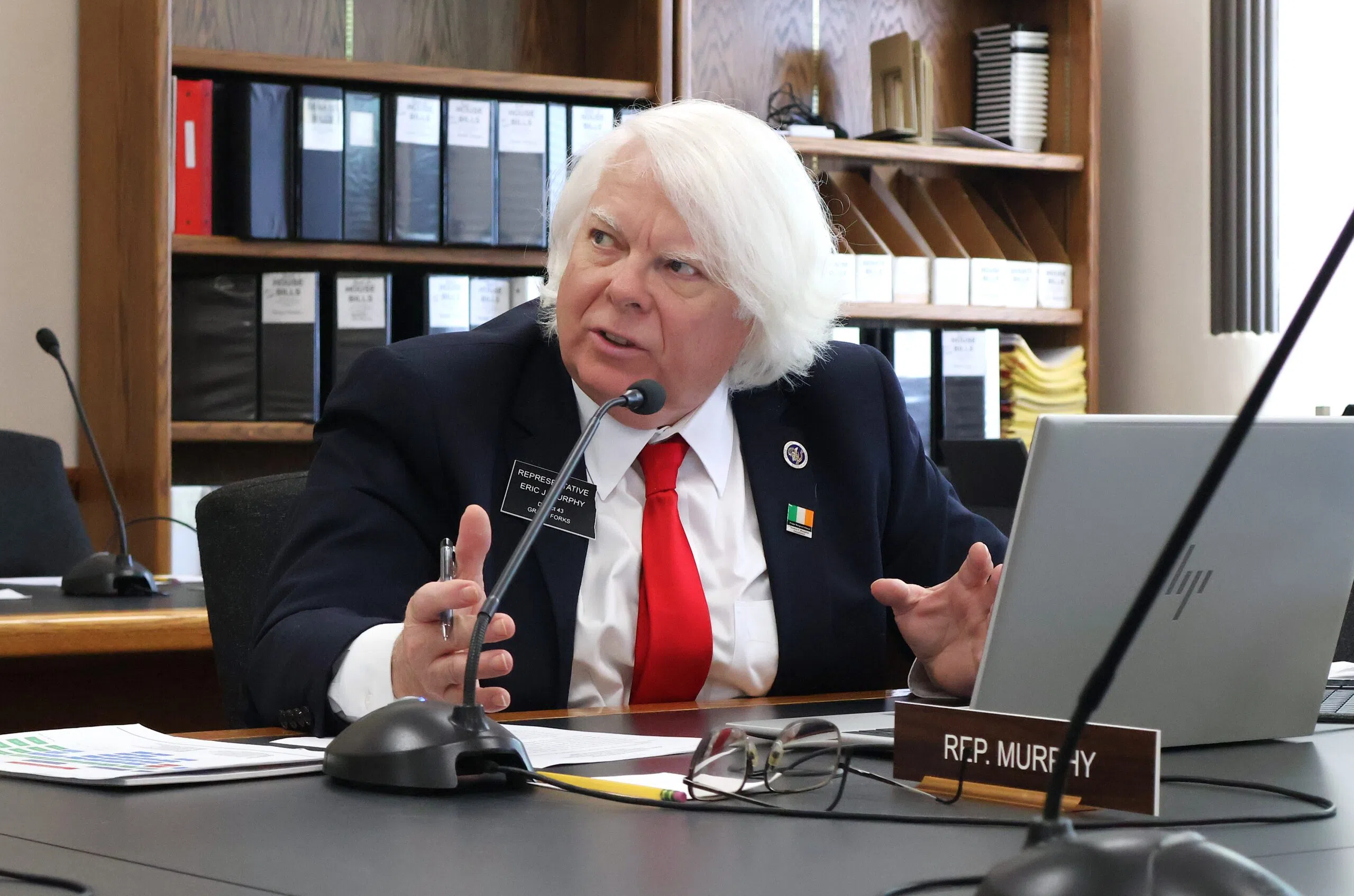
Rep. Eric James Murphy, R-Grand Forks, speaks during a meeting of the interim Education Committee on Sept. 24, 2024. Murphy plans to bring a bill during the 2025 session that would preserve some abortion access in North Dakota. (Michael Achterling/North Dakota Monitor)
By: Mary Steurer
BISMARCK, N.D. (North Dakota Monitor) – A Republican state lawmaker plans to introduce a bill he says will strike a science-based middle ground on abortion access.
Proposed by Rep. Eric Murphy, who’s also a medical school professor, the bill would allow women to receive abortions for any reason through week 15 of pregnancy in North Dakota. All abortions would have to be performed by qualified doctors at properly licensed health care facilities.
It takes several weeks for most women to find out they’re pregnant, the Grand Forks legislator said. He said women and their families should have enough time to weigh whether they want to continue a pregnancy or access abortion care.
“These are hard decisions,” Murphy said.
Abortions between weeks 16 and 26 would be allowed if deemed medically necessary, according to a draft of the legislation. They could only be performed by an obstetrician/gynecologist or a family medicine doctor with OB-GYN training at a licensed hospital offering abortion procedures.
In order to perform abortions at this stage of pregnancy, health care professionals would have to seek approval from a three-member committee of doctors appointed by their hospital. A simple majority vote would determine whether the abortion is medically needed.
Such committees would also be in charge of approving abortions after week 26, though with more restrictions. Doctors would have to attempt to deliver the fetus if possible, and could only resort to abortion as a life-saving procedure, Murphy said. He said he is still fine-tuning the language of this part of his proposal.
In all cases, committees would have to consider abortion requests as soon as possible and make their decision within five calendar days.
Each hospital’s abortion approval committee would include one doctor of obstetrics and gynecology, one family practice doctor, and one doctor specializing in either internal medicine or pediatrics. All three would have to be on the hospital’s staff. The identities of the doctors and the discussions of the committee would be confidential.
Under the proposed bill, doctors would still be allowed to perform abortions for emergency health reasons at any time to preserve the life of the mother without prior approval from a committee, according to Murphy.
“Let’s let medical professionals do their jobs and stop micromanaging,” Murphy said.
Murphy, who teaches pharmacology at the University of North Dakota School of Medicine and Health Science, said he was partly motivated to bring his bill after hearing how his former students were affected by the near-total abortion ban adopted by the Legislature in 2023.
That law made abortion illegal in all cases except rape or incest if the mother was pregnant for less than six weeks, or when the pregnancy posed a serious physical health threat.
That ban was struck down by a state judge in September, who found that women in North Dakota have a right to seek abortions up to the point of fetal viability.
The judge did not define fetal viability in his opinion, though medical professionals generally consider fetal viability to occur around 24 weeks of pregnancy.
The ruling came as part of a lawsuit brought by a group of reproductive health care doctors and a Moorhead, Minnesota-based abortion clinic, who argued doctors were withholding necessary health care from pregnant patients because the law did not give them adequate guidance on when the health care exemption applied. The state appealed the decision to the North Dakota Supreme Court, which has yet to reach a final decision in the case.
North Dakota does not have an abortion clinic. The Red River Women’s Clinic, which had been in Fargo before moving across the river, has no plans to move back to North Dakota, the director has said.
Murphy said that under the 2023 law, obstetricians he helped train had to send patients out of state to receive abortions — a practice he called “inhumane.”
“My former students tell me they need this,” he said.
With Murphy’s measure, hospitals would have to provide information about abortions performed at their facilities after 15 weeks to the North Dakota Department of Health and Human Services. This would include the number of procedures considered by their committees, how many they approved, and the quantity of emergency abortion procedures performed.
This data would be collected for statistical purposes only, according to Murphy’s proposal.
Murphy said he developed the language of the bill with help from reproductive health doctors. He said he’s still waiting for a formal draft from Legislative Council.
Sen. Janne Myrdal, who sponsored North Dakota’s previous abortion ban, said she was not familiar with the particulars of Murphy’s bill but would “vehemently oppose” any proposal to expand abortion access in the state beyond North Dakota’s previous abortion law. Myrdal also said she doubts other lawmakers would support the bill.
“There’s no way that will pass the House or the Senate currently,” the Edinburg Republican said.
The 2023 abortion ban was adopted with overwhelming support from both chambers. Murphy was among the 19 lawmakers who opposed the bill, including four other Republicans.
Rep. Gretchen Dobervich, D-Fargo, said while she supports greater abortion access she doubts the Legislature will go that direction this session.
“I hope that someday North Dakota women have the same legal protections and rights as their counterparts in other states where women have not been stripped of their body autonomy and equality,” Dobervich, who works in health policy, wrote in a statement to the North Dakota Monitor.
A recent poll of 500 North Dakotans published by the North Dakota News Cooperative found that about 55% of respondents oppose the state’s most recent near-total abortion ban compared with roughly 38% who support it.
The law was preceded by a similar abortion law the North Dakota Supreme Court found unconstitutional in March 2023.









Comments